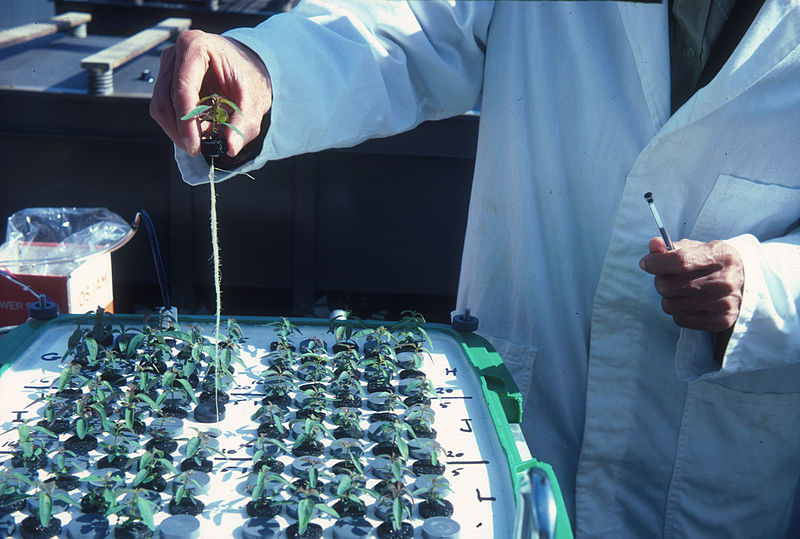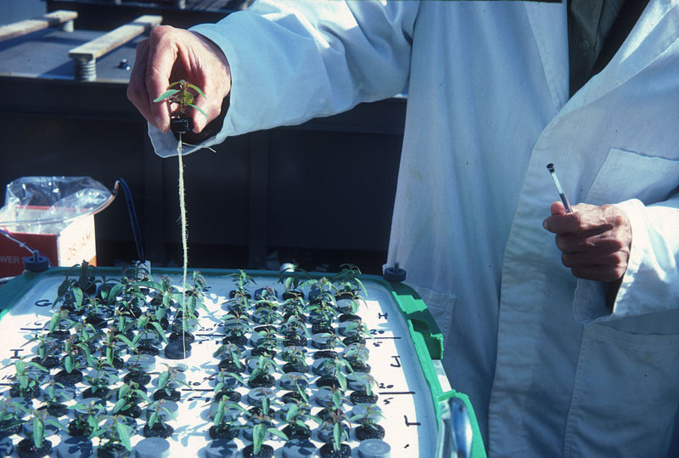"These products can benefit a person, but for me the question is how to combine them with existing analogues," member of the Academy Jennifer Kuzma said in an interview with MIT Technology Review.
Living bacteria-drugs
Scientists are trying to breed genetically modified bacteria that will help treat various diseases, from cancer to metabolic disorders. A pill stuffed with such bacteria is able to find hotbed of the disease and act in accordance with the genetic program.
Passing through the human body and going outside, these living microorganisms can get into sewage or even sources of drinking water. It is impossible to predict consequences of this. Scientists do not exclude that bacteria can exchange DNA among themselves. Besides, the genetic modification will intrude in other organisms. Thus, the regulators will have to check this development for its safety.
Genetically modified animals
At the beginning of the year, the US Food and Drug Administration (FDA) proposed new rules that require scientists to obtain permission to edit the animal genome. Now the FDA regulates only experiments in which the alien genome, that is, the DNA of another individual, is introduced into an animal’s genome. The new rules require scientists to obtain permission to make any changes to the genome.
Genetically modified plants are strictly regulated now, in particular, by the Ministry of Agriculture in the United States. However, products with an edited genome (already created by Cellectis and DuPont Pioneer companies) have not yet been watched closely as they do not have alien DNA.
Meat grown in the laboratory
Memphis Meats recently announced plans to sell chicken meat grown from cultured animal cells starting from 2021. This company is not the only one working on creation of proteins similar to animals. Production of such meat is less harmful to the environment and does not involve killing animals.
However, it is not clear who and how should regulate this product. There are simply no precedents. The US Department of Agriculture is engaged in natural products, and the FDA in the food additives. Laboratory meat does not fall into any of the existing categories.
Ever flowering plants
The National Academy of Sciences of the United States says that there are some new extravagant plants being bred now. Soon we may see ever flowering plant that emit a pleasant fragrance or even glow in the dark.
Such plants do not pose a threat to human health and are not causative agents of any diseases. Therefore, such developments require no special permission. However, there is a possibility that these plants can damage the wildlife.
Gene drive
This method allows rapid spreading an altered gene in a wild population of animals or plants, and is considered as an option for reducing pest populations (for example, rats or dangerous insects). The same method can help restore populations of rare animals.
Genetic drive has not been tested yet in the wild. Scientists believe that the consequences of irresponsible or malicious use of this method can lead to an ecological catastrophe. American scientists call for a public opinion survey and an independent examination of this method.
source: technologyreview.com
Living bacteria-drugs
Scientists are trying to breed genetically modified bacteria that will help treat various diseases, from cancer to metabolic disorders. A pill stuffed with such bacteria is able to find hotbed of the disease and act in accordance with the genetic program.
Passing through the human body and going outside, these living microorganisms can get into sewage or even sources of drinking water. It is impossible to predict consequences of this. Scientists do not exclude that bacteria can exchange DNA among themselves. Besides, the genetic modification will intrude in other organisms. Thus, the regulators will have to check this development for its safety.
Genetically modified animals
At the beginning of the year, the US Food and Drug Administration (FDA) proposed new rules that require scientists to obtain permission to edit the animal genome. Now the FDA regulates only experiments in which the alien genome, that is, the DNA of another individual, is introduced into an animal’s genome. The new rules require scientists to obtain permission to make any changes to the genome.
Genetically modified plants are strictly regulated now, in particular, by the Ministry of Agriculture in the United States. However, products with an edited genome (already created by Cellectis and DuPont Pioneer companies) have not yet been watched closely as they do not have alien DNA.
Meat grown in the laboratory
Memphis Meats recently announced plans to sell chicken meat grown from cultured animal cells starting from 2021. This company is not the only one working on creation of proteins similar to animals. Production of such meat is less harmful to the environment and does not involve killing animals.
However, it is not clear who and how should regulate this product. There are simply no precedents. The US Department of Agriculture is engaged in natural products, and the FDA in the food additives. Laboratory meat does not fall into any of the existing categories.
Ever flowering plants
The National Academy of Sciences of the United States says that there are some new extravagant plants being bred now. Soon we may see ever flowering plant that emit a pleasant fragrance or even glow in the dark.
Such plants do not pose a threat to human health and are not causative agents of any diseases. Therefore, such developments require no special permission. However, there is a possibility that these plants can damage the wildlife.
Gene drive
This method allows rapid spreading an altered gene in a wild population of animals or plants, and is considered as an option for reducing pest populations (for example, rats or dangerous insects). The same method can help restore populations of rare animals.
Genetic drive has not been tested yet in the wild. Scientists believe that the consequences of irresponsible or malicious use of this method can lead to an ecological catastrophe. American scientists call for a public opinion survey and an independent examination of this method.
source: technologyreview.com



















